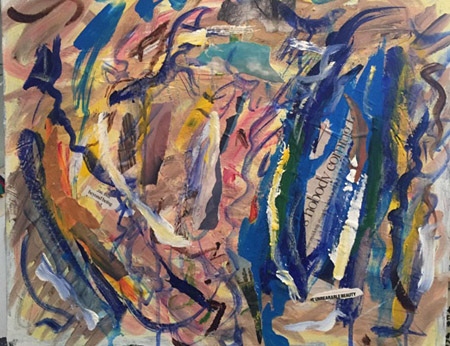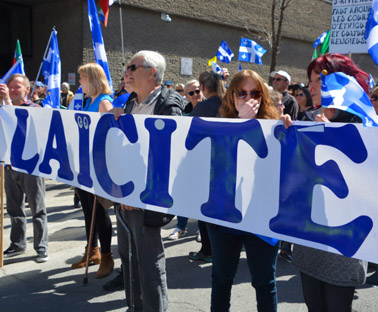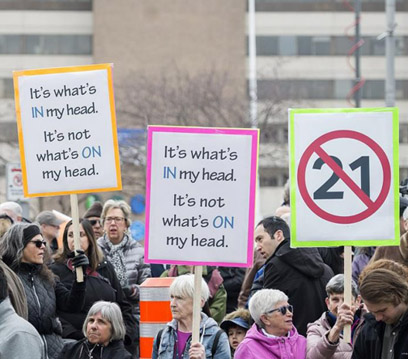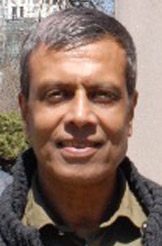There’s logic to Quebec’s Bill 21 : freedom from religion is inevitable part of better known cousin, freedom of religion
Jan 31st, 2022 | By Ashok Charles | Category: In BriefSPECIAL FROM ASHOK CHARLES, TORONTO. JANUARY 31, 2022 : As Kristopher Kinsinger explained a while ago in the Policy Options journal, Quebec’s still controversial Bill 21 : “In essence … prohibits state employees such as prosecutors, police officers and teachers from wearing religious symbols — including head and face coverings — when carrying out their civic duties.”
Like many others outside Quebec Mr. Kingsinger also believes that Bill 21 should be understood as outside Canadian constitutional law. But there is another quite logical side of the argument.
From this point of view Quebec’s Bill 21 is progressive and well-considered legislation, which deserves the widespread support it enjoys among Quebecers.
Two principles which need to be seriously considered in the continuing Bill 21 debate are those of separation of state and religion, and the right to freedom from religion.
In regard to the first principle, western democracies have done a reasonably good job of protecting government from the influence of religion. This is not to say that the separation is complete and sufficient. In Britain, twenty-six seats in the House of Lords are reserved for bishops of the Church of England and, in Canada, our Charter of Rights and Freedoms presupposes “the supremacy of God.” Still, constitutionally, and in practice, we are most of the way there.
However, it is not enough for a state to ensure that religious beliefs are not allowed to influence legislation or the operation of government. More than that, this policy must be apparent, and that requires that those working on behalf of the government do not advertise religious affiliations while performing their duties.
The second principle, freedom from religion, is, and must always be, a corollary to its better known cousin, freedom of religion. It ensures that religious messaging is absent from spaces in which it has no legitimate reason to be present.
Bill 21 will ensure that Quebecers, and visitors to La Belle Province, will not face religious messaging when receiving services from some civil servants, including judges, notaries, police officers and teachers. This is entirely just and the previous situation, in which one might be confronted by the symbols of another’s religious beliefs, when in court, at school, or interacting with law enforcement personnel was patently inappropriate and often offensive. In fact, one flaw of Bill 21 is that it doesn’t go far enough — there is still no protection from outward displays of religiosity when renewing your driver’s license, boarding a bus or being treated in a hospital. These services are also government funded and those who provide them shouldn’t be advertising their belief systems while at work.

Opponents of Bill 21 are critical of the reassignment of Fatemeh Anvari, a Grade 3 teacher in Chelsea, Quebec, who refused to remove her hijab while teaching. When federal Diversity and Inclusion Minister, Ahmed Hussen, says “A teacher should be judged on her professional competence to do the job not on her religion,” he’s absolutely right. But Bill 21 doesn’t require that Ms. Anvari renounce Islam to teach in Quebec ; it simply insists that she not advertise her religion to a classroom of impressionable children while doing her job.
We want teachers to be educating our children with an emphasis on evidence-based knowledge, and a confusing message is conveyed when that education is imparted by someone displaying their commitment to an ideology which does not prioritize evidence.
Bill 21 is not discriminatory in that it does not target any ethnic or cultural group ; it targets a behaviour — the practice of displaying ostentatious religious symbols on one’s person while engaging in paid work for a secular government.
It is every bit as important that we are not subject to religious messaging when interacting with public servants as it is that we are not confronted by political messaging. Just as it would be clearly inappropriate for a working police officer to wear a “Re-Elect Trudeau!” button, it is improper for Ms. Anvari to be announcing her religious affiliation while performing her professional duties.

While the principle of free expression allows for the projection of personal beliefs in the public space — and no one is seeking to restrict the wearing of crucifixes, hijabs, stars of David, turbans, burkhas, kippahs, niqabs, crosses, Satanist pentagrams, tilakas (the forehead markings worn by some devout Hindus) or “Re Elect Trudeau!” buttons in public — we must also ensure that there are spaces where such distracting messaging is absent, and the focus is solely on the duties performed and the services rendered. Our classrooms, courts, and other places where we interact with public servants clearly fall into this category.
Consider that though we’ve embraced or at least accepted capitalism we are not willing to permit corporate advertising everywhere. There are good reasons for confining billboards to commercial streets and keeping them out of residential neighbourhoods. Similarly, our recognition of the principle of free expression does not mean that we have to bear witness to displays of other people’s religious or political convictions everywhere, all the time. The arena of public service should be a space free of such messaging.
That at least is the 21st century philosophy of the secular state in Quebec. And while the majority in the rest of Canada does not seem to want to ban the democratically elected leader of the New Democratic Party of Canada from wearing a turban in the Canadian House of Commons (and even the Mounties have had turbaned officers since 1991), it is a message that deserves a little more fair hearing and respect than it often gets outside Quebec.
Ashok Charles was born in Madurai, Tamil Nadu, India. He spent his formative years in Thunder Bay, Ontario and is a graduate of Lakehead University. He then moved to Toronto where he graduated from Ryerson University in photographic arts, and has subsequently worked as a freelance photographer.
In the early 21st century Ashok became especially interested in democracy, the Canadian Charter of Rights and Freedoms, and the movement for an independent Canadian head of state. He is now executive director of Republic Now/République du Canada, and can be reached at director@republicnow.ca. ; or #419-110 Cumberland St., Toronto, ON. Canada. M5R 3V5.





